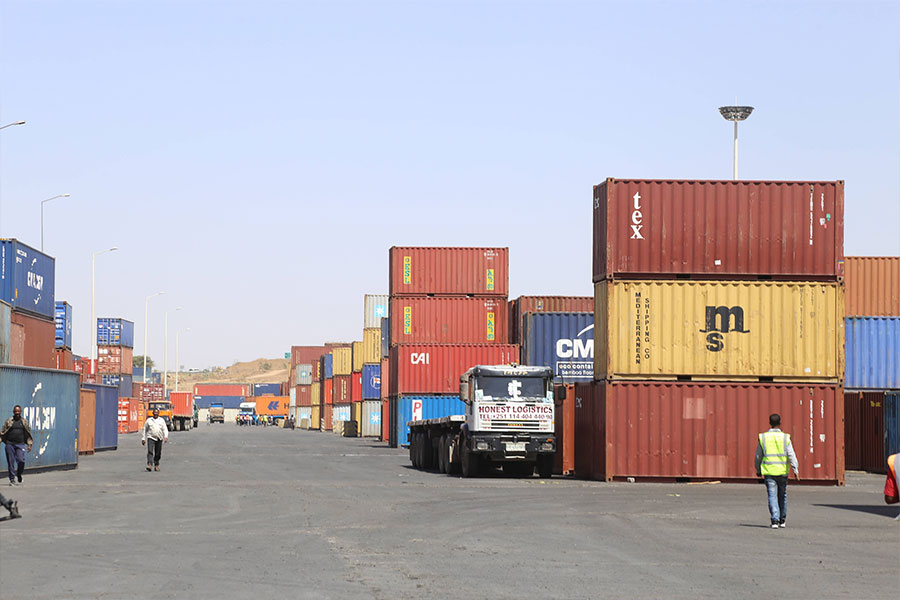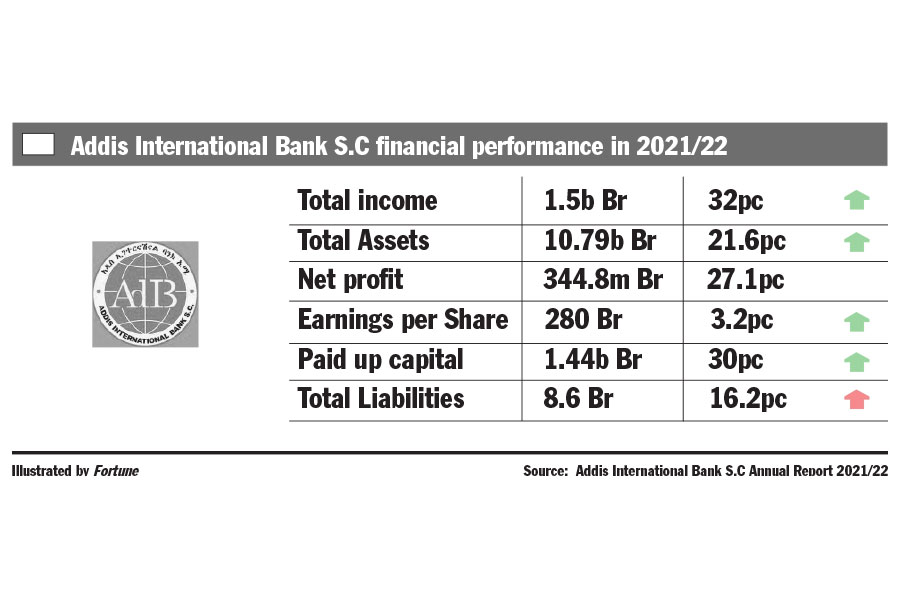
Fortune News | Jun 01,2019
In the late afternoon of Wednesday, March 11, 2020, Ehil Berenda (cereal crops floor), which is located in Merkato, the largest open market in the capital, was busy as usual. Daily labourers were unloading agricultural goods from vehicles, while others were negotiating with the traders to buy food items.
Beletu Kebede, in her early 50s, was among the crowd looking to buy teff. Beletu, a mother of four, buys 20Kg of red teff every month for her family.
Teff is one of the primary food items in Ethiopia. The traditional cereal crop is milled before it is fermented and then baked on large circular clay griddles to make a grey flatbread called injera.
Beletu, born and raised in Addis Abeba, spent 860 Br to buy her usual amount of teff, amazed at the price increase this month. Previously, she used to buy only white teff, which is a higher quality product. But since the price of food is increasing and becoming unaffordable, she buys red teff, a lesser regarded variety, and mixes it with rice and maize.
She thought that since it is a harvest season, the price of food would decrease. Instead, the opposite has happened.
"My expectation was that the price of teffwould decrease or remain constant since the previous month," she said. "But the price shows an increase, and I have to mix the teffwith maize for it to be enough to feed my family."
Compared to two months ago, the price for red and white teff increased by 300 Br and 400 Br per quintal, respectively.
Even though the supply of food increases in February, normally dragging the inflation rate down, this did not happen to the market this year.
The data from the Central Statistical Agency (CSA) shows that headline inflation, an indicator of the cost of living, hit 21.8pc annually last month, the highest rate in six years. The rate jumped by three percentage points the month before last, leading to 18.7pc annual inflation, according to the latest Consumer Price Index from CSA. February's rate is the second-highest in six years after the 22.2pc rate registered in 2014.
Food inflation has marked a 3.1-percentage-point increase to reach 25.1pc, while the non-food inflation rate registered a three-percentage-point rise to 18pc.
"Except for rice and wheat, the price of almost all other cereals rose during the month," reads the report.
The rise in inflation for non-food items has steadily been increasing in recent months mainly due to rises in the prices of khat, coffee, clothing and footwear, house rent, household goods and furnishings, healthcare and automobiles, according to the Agency.
Five years ago in February, the food inflation rate was 9.6pc, while the non-food inflation rate stood at 6.8pc. Since then, the inflation rate has climbed 2.6 times more for both.
Compared with Kenya, whose inflation rate stood at 6.4pc in February of 2020, the highest since April 2019, the current inflation numbers of Ethiopia are alarming.
Customers negotiate with traders to buy food items for their consumption at Ehil Berenda.
The wholesalers in Merkato also agree that the price of food items has increased.
Semeneh Yiferu, the owner of a cereal shop in Ehile Bernda, inherited the business from his family.
The father of three sells 20 quintals a week, but his regular customers are not buying as usual. He receives teff from the suppliers from Gojjam, Adda, Bale and Olonkomi in Ambo four times a month.
He currently unloads teff from his suppliers for 3,900 Br and 3,750 Br for white and red teff, respectively.
After considering transportation and labour costs, he sells a quintal of white tefffor 4,300 Br and a quintal of red teff for 3,900 Br. He also sells maize at 1,500 Br, adding about 1.50 Br a kilogram, and wheat for 2,050 Br, the same price as before.
"We don't even know the reason why our suppliers increased the prices," he said. "The farmers are not the beneficiaries, but the brokers always make the profit."
"If I refuse to buy the food items at the prices they offer, they will stop supplying the products to me in the future," he said.
A tefffarmer who also produces maize and wheat says that they do not benefit from the increase in the prices of their products.
Webet Ayel, who lives in Central Goder, West Denbia District, has been farming for the last three decades. The father of five cultivated 15ql of teffand 20ql of maize on his two-hectare plot of land the previous year. But due to the untimely rain, he could not even harvest five quintals this year.
Brokers buy a quintal of teff from him for 3,100 Br, but it costs 1,000 Br more when it is availed to the market. A year ago he sold white tefffor 2,100 Br.
"The middlemen cut the prices when they buy our products," Webet said. "The income we get after selling our crops isn't enough to cover our production cost like fertilisers," he adds.
Harvest crops enter the market in November, December and January, except for maize, which usually comes during the rainy season (Belgand Kiremt) and the data from CSA supports this.
The inflation rate started to grow in July 2017, according to Alemayehu Teferi, director of household studies and cost statistics at the Agency.
The inflation on prices of cereals in February 2020 has increased by 27.9pc compared to the same month last year.
"The major problem is the consumer is unable to buy the same quantity of goods and services in the current month as compared to a similar month last year, Alemayehu said.
"If there's no increase in the income of the consumer, the standard of living declines and consumers become poorer than the same period last year," he adds.
Alemayehu puts market manipulation by brokers fixing artificial prices, supply shortages, population growth and natural disasters (locust swarms and drought) as the reasons for the hike in the prices of food items.
The Ministry of Agriculture does not agree that the shortage of supply is the reason for inflation. The Ministry states that agricultural productivity increases by 4.4pc annually.
There is sufficient production of teff and maize in the country. The main problem is brokers increasing the prices, according to Germame Garuma, agricultural extension director at the Ministry.
"We were notified that there would be untimely rain, and we mobilised communities to collect harvests before they were damaged," Gurmame said. "We're also trying to prevent insects from reaching farmlands."
Since the rainfall was average and adequate in the last fiscal year, the primary season crop production has shown significant increases both in terms of the area of the land utilised and the volume of crop production.
"More than 95pc of the country's agriculture depends on rain, so we have to mechanise our way of farming to increase productivity," Germame said.
The significant challenges in the agricultural sector is the backwardness of technology and soil damaged by acid, according to him.
"To tackle this, we're working on treating lands with limestone," he said.
The nation has 71.4 million farmers who cultivate 13 million hectares of land, and last year agricultural production yielded 315 million quintals of grain and crops. Agriculture contributes close to 46pc of GDP and employs over 80pc of the population. Out of the total budget of 386.9 billion Br, Ethiopia allocated 14.5 billion Br for agriculture and rural development.
The Ministry of Agriculture argues that agricultural productivity has increased by 21pc since the 2014/15 fiscal year that yielded 270.3 million quintals of grain. In the last season, cereal crops were grown on 10.2 million hectares of land, of which three million hectares were covered by teff, producing 54 million quintals.
Last year the country harvested 315 million quintals of grain and crops, a mere three percent increase from the previous year.
Teffoccupies 17.5pc of all farmable land in Ethiopia, and the average productivity per hectare is 18ql or 40ql for maize.
Sani Redi, state minister for Agriculture, listed four reasons for the increase in the price of food items.
The long trade chain, the imbalance of food items demanded versus agricultural productivity, the increasing population, and the holding of products in warehouses to create artificial shortages are the primary factors, according to Sani.
The government has undertaken many activities to increase the productivity of agriculture, according to the state minister.
Alemayehu Geda (Prof.), a prominent macroeconomist and university lecturer, believes that since it is a harvest season, food prices should have gone down.
He cited the low agricultural productivity yields, the higher money supply in circulation and the long supply chain as the reasons for the increase in the inflation rate.
The government should identify the major food items and start providing them through consumer unions at regulated prices as a short-term solution and mechanise agriculture for long-term positive results, according to Alemayehu. He also fears that inflation will continue because of the delay in transport and the spread of Novel Coronavirus (COVID-19).
To meet the demand, the country is currently undertaking the implementation of the Homegrown Economic Reform Agenda, which includes commercial clustering of 408 districts, allowing contract farming where farmers can lease their land, determining prices and items for production, and mechanising the agricultural industry by excluding equipment from import taxes, according to Sani.
"The government availed a 20 billion Br supplement to the budget for irrigation to alleviate the industry's 95pc dependency on rain to increase production two to three-fold," said Sani.
Besides this, we also try to facilitate access to loans for farmers from financial institutions by using their land as collateral, Sani said.
Sani believes that after this reform, prices will stabilise.
Melaku Alebel, minister of Trade & Industry, disclosed that the Ministry has formed a task force that will work on improving supply and control the exaggerated price hikes on medical equipment and consumer products in the capital.
"The task force will start taking measures as of tomorrow [March 14, 2020]," he tweeted.
Beletu, a retired teacher, is also hoping for a miracle that stabilises the market.
PUBLISHED ON
Mar 14,2020 [ VOL
20 , NO
1037]

Fortune News | Aug 28,2021

Commentaries | Jul 03,2021

News Analysis | Jan 19,2024

Editorial | Apr 30,2022

News Analysis | Apr 22,2023

Dec 22 , 2024 . By TIZITA SHEWAFERAW
Charged with transforming colossal state-owned enterprises into modern and competitiv...

Aug 18 , 2024 . By AKSAH ITALO
Although predictable Yonas Zerihun's job in the ride-hailing service is not immune to...

Jul 28 , 2024 . By TIZITA SHEWAFERAW
Unhabitual, perhaps too many, Samuel Gebreyohannes, 38, used to occasionally enjoy a couple of beers at breakfast. However, he recently swit...

Jul 13 , 2024 . By AKSAH ITALO
Investors who rely on tractors, trucks, and field vehicles for commuting, transporting commodities, and f...

Nov 1 , 2025
The National Bank of Ethiopia (NBE) issued a statement two weeks ago that appeared to...

Oct 25 , 2025
The regulatory machinery is on overdrive. In only two years, no fewer than 35 new pro...

Oct 18 , 2025
The political establishment, notably the ruling party and its top brass, has become p...

Oct 11 , 2025
Ladislas Farago, a roving Associated Press (AP) correspondent, arrived in Ethiopia in...